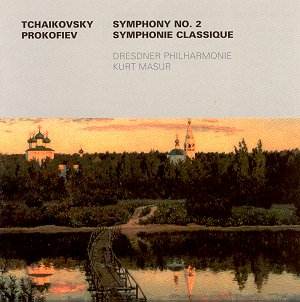This is a curious coupling of two works with no apparent
link apart from the obvious one that both composers were Russian.
"Little Russia" was the Ukraine, and Tchaikovskyís
Second Symphony received its nickname because of the composerís copious
use of regional folk music in the work. The opening horn melody is a
variant of such a folk song, and there are many examples throughout
the piece. At a little over half an hour it is one of Tchaikovskyís
shorter symphonies, and certainly one of the most light-hearted. The
slow movement is a reworking of material from an earlier composition,
and the scherzo and finale are both high spirited and brilliantly written.
Whether or not the folksong elements are successfully integrated into
a convincing symphonic structure is open to discussion. What is certain
is that although there is a fair bit of brooding in the first movement
the work as a whole has little of the weight and gravity we often associate
with this composer.
From the moment the principal horn begins to play the
opening solo we are in no doubt as to which part of the world the orchestra
comes from, and all of the brass, the trombones in particular, have
this characteristic Eastern European sound. The strings have a richness
of tone which would not be out of place coming from the other Dresden
orchestra, and the orchestral playing as a whole is of a high standard.
Kurt Masur conducts a straightforward reading of a relatively straightforward
piece, but one element in particular, and a crucial one at that, is
lacking. There is weight, there is power, there is even excitement where
itís called for, but thereís very little in the way of a smile in this
music-making, which is a pity in this of all Tchaikovsky symphonies.
Things improve as the work progresses, and the finale is perhaps the
most successful in this respect, but itís not difficult to find any
number of readings which seem to be closer to the mark. Abbado with
the New Philharmonia Orchestra (DG) is particularly convincing in a
similarly priced reissue, but there are many others, most intriguingly
a recording of the unrevised version Ė with an almost completely different
first movement amongst other differences Ė conducted by Geoffrey Simon
on Chandos.
Exactly the same comments are applicable to the Prokofiev,
but here the work is even more seriously weakened. Masurís view of this
absolute jewel of a piece is strong on drama but crucially lacking in
charm and grace. The first movement in particular suffers from this:
the music sounds almost angry in a way Iíve never heard in this piece
before. The reading is very classical, to be sure; thus the main theme
of the slow movement played by high violins arrives with a relatively
definite attack rather than appearing from nowhere as in many other
performances, but I find this neither attractive nor convincing. The
gavotte is more expressive, but the helter-skelter finale is again rather
hard driven, and the rapid passages are not as technically secure as
they might be. The Orpheus Chamber Orchestra (DG) are excellent, but
my favourite performance is conducted by Previn with the Los Angeles
Philharmonic Orchestra on a hard to find Philips disc.
Masur is a magnificent conductor who doesnít seem at
home in this repertoire. Given that such an important element of each
of these pieces is missing I couldnít recommend this disc even to someone
who happened to be looking for this particular coupling though the blow
is softened only slightly by Edelís price.
William Hedley


